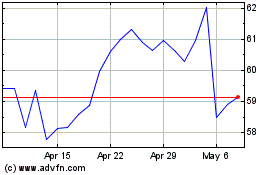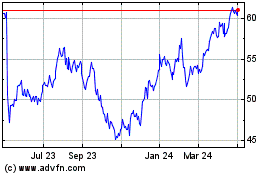Floods Deal Costly Blow to Farm Belt -- WSJ
March 29 2019 - 3:02AM
Dow Jones News
By Jesse Newman
This article is being republished as part of our daily
reproduction of WSJ.com articles that also appeared in the U.S.
print edition of The Wall Street Journal (March 29, 2019).
Severe flooding in the Midwest is damaging fields, disrupting
shipments and dealing a costly blow to growers and agribusinesses
as a downturn in the farm economy stretches into a sixth year.
Swollen rivers in Nebraska, Iowa and other states after months
of heavy snow and rain have swamped grain bins and washed away
cattle. The deluge has impeded crop shipments for U.S. grain
traders and inundated roads and rail lines that companies including
Hormel Foods Corp. and Tyson Foods Inc. use to move meat.
Cargill Inc. said Thursday that flooding last week closed three
of the agricultural conglomerate's grain elevators in Nebraska for
a day, as well as one in Iowa. Grain-trading giant Archer Daniels
Midland Co. said Monday that flooding and punishing winter weather
would cut its first-quarter operating profit by up to $60 million.
ADM idled a facility in Columbus, Neb., that makes products
including ethanol for 24 hours last week after floodwaters swamped
a nearby rail line.
"We won't be able to resume normal operations until full rail
service is back up and running," said Chris Cuddy, president of the
ADM unit that oversees grain-milling operations.
The plant's reduced operations have meant lower demand for corn
from farmers like Dan Wesely, depriving him of income to run his
fifth-generation farm.
"It's another weight," Mr. Wesely said. "Farmers take risks all
the time, but it just adds one more thing."
The deferred corn sales will tighten Mr. Wesely's budget as he
and other U.S. farmers navigate the steepest agricultural slump
since the 1980s. Low prices for corn, soybeans and other farm goods
have pressured farm incomes in recent years and boosted farm debt
to the highest level in decades.
Bankruptcy filings are rising throughout much of the Midwest,
and ongoing trade disputes with big customers for U.S. agricultural
commodities like China are deepening anxiety across the Farm
Belt.
Mr. Wesely must wait for his fields to dry out before planting
corn and soybeans this spring. Some farmers won't be able to plant
at all. More flooding is forecast across the Midwest over the next
two months.
Flooding also has caused disruptions for big meat companies.
Tyson, the largest U.S. meatpacker, said road closures in flooded
regions were forcing the company's delivery trucks to take detours,
though its processing plants are running normally. Hormel said
floodwaters had disrupted operations at a supplier's Nebraska plant
that is working to return to full capacity. Damage to cold-storage
warehouses and regional infrastructure is causing delays loading
its trucks and railcars, Hormel said.
Cargill said floodwaters also disrupted operations at a Fremont,
Neb., facility that manufactures nutrition products used in animal
feed. Cleanup efforts are underway and the plant should be
operating again soon, a spokeswoman said.
High water also is hindering the flow of crops from farms to
U.S. export terminals, slowing barge traffic on the Mississippi
River and limiting port operations. ADM said its barge
transportation volumes are down significantly from years prior.
CHS Inc., the largest U.S. farmer cooperative, said a Minnesota
facility that would typically be loading barges with grain by now
likely won't be operational until May because of high water.
"It's not ideal from a financial perspective," said John
Griffith, head of global grain marketing for CHS.
CHS said northbound barges carrying fertilizer that it sells to
farmers also have been delayed, creating logjams across the entire
agricultural supply chain.
Green Plains Inc., one of the largest U.S. ethanol producers, is
storing the corn-based fuel in railcars at facilities where floods
have impeded rail lines that carry it away from plants. Chief
Executive Todd Becker said some plants could interrupt or slow
production if rail service doesn't resume by the end of this
week.
"At this point we're just hoping for the best," Mr. Becker
said.
Write to Jesse Newman at jesse.newman@wsj.com
(END) Dow Jones Newswires
March 29, 2019 02:47 ET (06:47 GMT)
Copyright (c) 2019 Dow Jones & Company, Inc.
Tyson Foods (NYSE:TSN)
Historical Stock Chart
From Jun 2024 to Jul 2024

Tyson Foods (NYSE:TSN)
Historical Stock Chart
From Jul 2023 to Jul 2024
